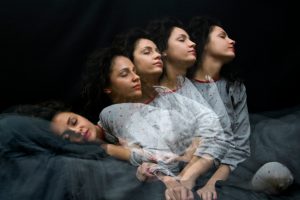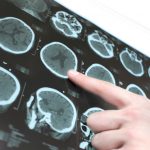 Sleep is an integral part of our health. It’s that nightly spell where we recharge so we can take on the next day. Sleep is also important to give our bodies a restart. It helps store memories, events and even reduces stress. Clearly, sleep is important and we should all ensure we’re getting enough of good quality sleep.
Sleep is an integral part of our health. It’s that nightly spell where we recharge so we can take on the next day. Sleep is also important to give our bodies a restart. It helps store memories, events and even reduces stress. Clearly, sleep is important and we should all ensure we’re getting enough of good quality sleep.
But unfortunately there are many sleep disorders which can inhibit our ability to get the proper sleep we require. From insomnia to sleep apnea, sleep disorders can wreak havoc on our health.
Advertisement
One sleep disorder is called rapid eye movement (REM) behavior disorder. To understand this disorder it’s important to understand the role of REM while we sleep.
What is REM sleep?
 REM sleep is a phase our bodies go through while we sleep. Like the name suggests our eyes move rapidly and it is the part of the sleep cycle where dreams occur. During a typical night’s rest we experience REM sleep a quarter of the time.
REM sleep is a phase our bodies go through while we sleep. Like the name suggests our eyes move rapidly and it is the part of the sleep cycle where dreams occur. During a typical night’s rest we experience REM sleep a quarter of the time.
REM occurs after three phases of N-REM, or non-rapid eye movement sleep. The sleep transitions rotate between sleep, light sleep, deep sleep and REM sleep, or dream sleep.
During REM sleep our bodies enter a temporary paralysis. Without this it may cause people to physically act out what they are dreaming.
| Sleep Stage | Effect |
|---|---|
| N-REM 1/ Stage 1 | Your eyes are closed and it is easy to wake you up |
| N-REM 2/ Stage 2 | You are in light sleep. Your body gets ready to go in deep sleep |
| N-REM 3/ Stage 3 | Also called deep sleep state. It is hard to wake you in this state and when someone wakes you,you feel disoriented. |
| REM | This phase happens 70 to 90 minutes after you fall asleep |
The function of REM sleep is to consolidate memory and, particularly in infants, it helps the development of the central nervous system. So as you can see it is an important part of our nightly resting.
REM sleep behavior disorder
 REM sleep disorder occurs while an individual is sleeping but they begin acting out. For example if they are having a vivid dream they may move in ways which act out the dream. This is referred to as parasomnia.
REM sleep disorder occurs while an individual is sleeping but they begin acting out. For example if they are having a vivid dream they may move in ways which act out the dream. This is referred to as parasomnia.
Unlike sleepwalking, where when the person is awake they are dazed and confused, those with REM sleep behavior disorder command full recollection of their dream and actions.
REM sleep behavior disorder can be quite dangerous for the individual and anyone whom they share sleeping quarters with. Injury can occur as the person’s movements become more intense.
One thing to note is unlike other sleep disorders which may leave the person sleepy and groggy the next day, those with REM sleep behavior disorder wake up still feeling refreshed.
Causes and symptoms of REM sleep behavior disorder
 So what exactly causes a person to act out their vivid dreams? Unfortunately that is still unknown. There have been some links between sufferers of REM sleep behavior disorder who also have other neurological conditions like Parkinson’s disease and Lewy Body dementia. Withdraw from drug or alcohol use may also be a cause for REM sleep behavior disorder.
So what exactly causes a person to act out their vivid dreams? Unfortunately that is still unknown. There have been some links between sufferers of REM sleep behavior disorder who also have other neurological conditions like Parkinson’s disease and Lewy Body dementia. Withdraw from drug or alcohol use may also be a cause for REM sleep behavior disorder.
Symptoms of REM sleep behavior disorder ultimately depends on the dream the individual is having. Some symptoms may include:
- Noises like yelling, shouting, crying, laughing or screaming
- Movements which may involve punching, kicking, jumping or grabbing
- Having the ability to recall the dream once awake.
As you can see, because symptoms are dependant on the dream experience, risk of injury may be mild or quite severe.
Treatment and home care for REM sleep behavior disorder
The main risk involved for those who have REM sleep behavior disorder is safety. If someone you know has this sleep disorder, making sure they are safe when sleeping is vital. One may add padding to a room either on the floor or on the bed posts. Another helpful suggestion is removing anything from the room that can be grabbed and used as a weapon. This may include sharp objects or even large objects which can inflict injury.
Barriers on the side of the bed may also help prevent falls and ensure windows are sealed so the person can’t open them and potentially fall out.
Another form of treatment may be to manage any underlining neurological conditions. Because often there is a link between the two, proper management of medical conditions may help minimize one’s likelihood of experiencing REM sleep behavior disorders.
Lastly, a doctor may prescribe sleep aids or medications to reduce anxiety. These may be effective in treating symptoms of REM sleep behavior disorder.
As there are no negative effects to energy and to the role of sleep from REM sleep behavior disorder, the main concern then is to prevent injury. Once a person can ensure they can be kept safe, they can still reap the benefits sleep has to offer.
Related Reading:
Your lack of sleep can cause heart disease
There is a slew of health conditions which are plaguing Americans. From diabetes, to blood pressure these are just some health concerns wreaking havoc on the health of Americans. Some health concerns are related, so much so that if one area is unhealthy it can lead to additional health concerns. Continue reading…
Advertisement
Hypertension linked to poor sleep
When it comes to high blood pressure – or hypertension – there are many factors that come into play: Diet, weight, smoking and alcohol use can all be attributed to your rising blood pressure. But does lack of sleep increase hypertension? In fact, it does. Continue reading…
Sources:
http://www.sleepeducation.com/sleep-disorders-by-category/parasomnias/rem-sleep-behavior-disorder
http://sleepfoundation.org/sleep-disorders-problems/rem-behavior-disorder/treatment
http://www.webmd.com/sleep-disorders/guide/rem-sleep-behavior-disorder
http://www.mayoclinic.org/diseases-conditions/rem-sleep-behavior-disorder/basics/treatment/con-20036654
http://www.helpguide.org/articles/sleep/how-much-sleep-do-you-need.htm
http://www.medicalnewstoday.com/articles/247927.php
